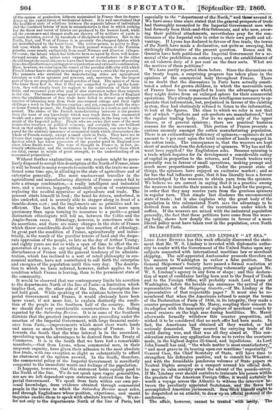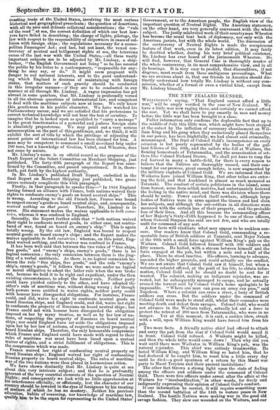BELLIGERENT RIGHTS, AND LINDSAY " AT SEA." LORD JOHN RUSSELL
has this week officially disavowed the state- ment that Mr. W. S. Lindsay is invested with diplomatie autho- rity to confer with the Government of the United States upon any subjects connected with international maritime law or merchant shipping. The self-appointed Ambasiador proceeds therefore on his mission to Washington in rather a false position. The General Shipowner's Society have passed a formal resolution at their recent annual meeting, protesting 'vehemently' against Mr. W. S. Lindsay's agency in any form or shape ; and this declara- tion of want of confidence having been sent to the Board of Trade and to the Foreign Office, will probably reach Lord Lyons at Washington, before the heralds can announce the arrival of the representative of the Shipping Gazette,—if Mr. Lindsay is the representative of that respectable paper ? It must also be re- membered that when the Americans refused to accept the terms of the Declaration of Paris of 1856, in its integrity, they made a counter proposition through Mr. Marcy, coupling their consent to its adoption with the immunity of capture of merchant vessels by armed cruisers on the high seas during hostilities. Mr. Marcy afterwards formally withdrew this counter proposition, and wished it to be considered that no such offer had been made. In fact, the Americans had obtained all they wanted, or had seriously demanded. They secured the' carrying trade of the world during war, and that was all they aimed at. This con- sideration renders any application from us to revive the overtures made, in the highest degree ill-timed, and injudicious. As Lord John Russell has said, " the whole matter is most unsatisfactory,"_ " and most grave in its bearing upon our maritime superiority. " General Cass, the Chief "SEcretary of State, will have time to strengthen his 'defensive position, and to consult his Wheaton ; and with the formidable ponderous volumes of State papers on Neutral Rights arrayed as a rampart around his "official desk, he inv' in cairn serenity await the advent of the psuedb-envoy. If Mr. Lindsay ever should contrive to insinuate his person within the precints of the American Foreign Office, it would certainly be worth a voyage across the Atlantic to witness the interview be- tween the peculiarly appointed Scotehman, and the fierce but accomplished American jurisconsult. Sam Slick himself ought to be despatched as an attache, to draw up an official protocol of the
conference. - - The affair, however, cannot be treated with levity. The
coasting trade of the United States involving. the most curious historical and geographical precedents ; the question of desertions, with all its nice and delicate collateral considerations ; the "rule of the road " at sea, the correct definition of which our best law- yers have failed in describing ; the charge of lights, pilotage' the law with respect to the responsibility of shipowhers in cases ofcol- lision with foreign ships ; the regulations necessary for a cosmo- politan Passengers' Act ; and last, but not least, the vexed con- troversy of neutral and belligerent rights at sea, the teterrima cause of the last war with the United States,—all these -vastly important subjects are to be adjusted by Mr. Lindsay, a ship- broker, "the English Government not being" as he has assured the public by his letter to a contemporary, "responsible for any- thing he may say, or do." It might seem pregnant with danger to our national interests, and to the good understand- ing which England is desirous of maintaining with foreign states, that matters of such gravity should be conducted in this irregular manner—if they are to be conducted in any manner at all through Mr. Lindsay. A vague impression has got abroad in some quarters, that Mr. Lindsay is profoundly versed in all the abstruse questions of international law, and competent to deal with the maritime subjects now at issue. We only know this gentleman in his public character. We have watched his Parliamentary career, and we are satisfied that his pretensions to correct technical knowledge will not bear the test of scrutiny. To imagine that he is looked upon as qualified to "carry a message" to the great functionaries of a powerful and jealous foreign state is absolutely preposterous. We may point out a very serious misconception on the part of this gentleman, and, we think, it will exhibit the sort of title by which the privilege of adjusting the nicest points of international law has been claimed for him. A man may be competent to command a small merchant brig under 100 tons, but a knowledge of Grotius, Vette], and Wheaton, does not come by nature.
Mr. Lindsay's name is on official record as the proposer of the Draft Report of the Select Committee on Merchant Shipping, just published. The forty-fifth paragraph of the Report was sanc- tioned by the Committee, and passed unquestioned. It is, there- forth, put forth by the highest authority. In Mr. Lindsay's published Draft Report, embodied in the final Report on Merchant Shipping just published, two grave errors seriously complicate this 45th paragraph.
Firstly, in that paragraph he speaks thus—" In 1854 England having formed an alliance with France, both nations waived their rights to confiscate enemy's goods on board neutral ships." This is wrong. According to the old French law, France was bound to respect enemy's goods on board neutral ships, and, consequently, waived nothing on that point. Therefore, Mr. Lindsay is in error. His statement makes the waiver applicable to both coun- tries, whereas it was confined to England.
Secondly, the Report further adds that " both nations waived their right to confiscate neutral goods, in either case, not contra- band of war, found on board an enemy's ship." This is again totally wrong. By the old law, England was bound to respect neutral goods on board enemy's ships ; and the Report makes the waiver applicable to both countries ; whereas, on this point, Eng- land waived nothing, and the waiver was confined to France.
It has been well said that between the two rules of " free ships, free goods," and " enemy's ships, enemy's goods," there is no logical connexion ; the only connexion between them is the jing- ling of a verbal antithesis. As there is no logical connexion be- tween the rule "free ships, free goods," and the rule "enemy's ship's, enemy's goods," it follows that we were under no logical or moral obligation to adopt the latter rule when the war broke ont,, because we held it to be right and expedient, under the then existing circumstances, to adopt the former rule. Neither party could have yielded entirely to the other, and have adopted the other's rule of maritime war, without doing wrong ; for though both powers were entitled to waive rights, neither party could with honour have disregarded obligations. For instance, France could, and did, waive her right to confiscate neutral goods on board Russian ships, and England could, and did, waive her right to confiscate the property of Russians on board neutral ships ; but France could not with honour have disregarded the obligation imposed on her by many treaties, as well as by her law of na- tions, of respecting the property of Russians on board neutral ships.; nor could England have set aside the obligations imposed upon her by her law of nations, of respecting neutral property on board Russian ships. Therefore, the only honourable compromise which France and England could have made with regard to their rales of maritime war must have been based upon a mutual waiver of rights, and a strict fulfilment of obligations. This is the compromise which was made. France waived her right of confiscating neutral property on board Russian ships ; England waived her right of confiscating Russian property on board neutral ships. The rules of maritime war of the two nations were thus placed in harmonious action.
We have shown distinctly that Mr.. Lindsay is quite at sea about this very intricate subjeet; and that he is profoundly ignorant of the very essential elements of the question of Neutral Rights ; and consequently we look with no little apprehension at his interference officially, or officiously, lest the, character of our country should be, lowered in the eyes of foreigners by his treating of matters.of iwhieh he has no mastery. Neither his previous•education habits of reasoning, nor knowledge of maritime law, qualify him' to be the organ for representing to the United States'
Government, or to the American people, the English view of the important question of Neutral Rights. The American statesmen, on the other hand, are very generally conversant,with the whole subject. The justly celebrated work of their countryman Wheaton has become the usual text book of diplomacy, not only with the American jurists, but with the whole world. The discussion of the controversy of Neutral Rights is made the conspicuous feature of that work, even in. its latest edition. It may fairly be doubted whether, during his very brief political existence, Mr. Lindsay has ever heard of the jurisconsult Wheaton. He will find, however, that General Cass is thoroughly master of the whole controversy, in its most comprehensive view, and in all its bearings. It is very easy to predict, that discomfiture, if not disgrace, must result from these ambiguous proceedings. What we are anxious about is, that our friends in America should dis- tinctly understand how totally Mr. Lindsay is without any com- mission, whether of a formal or even a virtual kind, except from Mr. Lindsay himself.



























 Previous page
Previous page